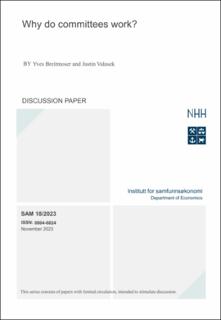| dc.description.abstract | We report on the results of an experiment designed to disentangle behavioral biases in information aggregation of committees. Subjects get private signals about the state of world, send binary messages, and finally vote under either majority or unanimity rules. Committee decisions are significantly more efficient than predicted by Bayesian equilibrium even with lying aversion. Messages are truthful, subjects correctly anticipate the truthfulness (contradicting limited depth of reasoning), but strikingly overestimate their pivotality when voting (contradicting plain lying aversion). That is, committees are efficient because members message truthfully and vote non-strategically. We show that all facets of behavior are predicted by overreaction, subjects overshooting in Bayesian updating, which implies that subjects exaggerate the importance of truthful messages and sincere voting. A simple one-parameteric generalization of quantal response equilibrium capturing overreaction covers 87 percent of observed noise. | en_US |
